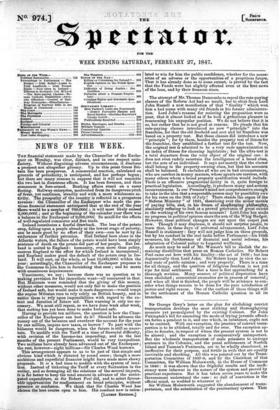NEWS OF THE WEEK.
Min financial statement made by the Chancellor of the Exche- quer on Monday, was clear, distinct, and in one respect satis- factory. Without disguising adverse circumstances, it discloses a prospect not altogether gloomy. Up to this point Great Bri- tam has been prosperous. A commercial reaction, calculated on grounds of periodicity, is anticipated, and has perhaps begun; but there are many reasons to suppose that it will not resemble the two last in disastrous effects. It has been foreseen, and thus commerce is fore-armed. Banking affairs stand on a surer footing. Railway enterprise, moderated from its dangerous pitch of fever, yet continues, steadily and with a more wholesome ac- tivity. The prosperity of the country is reflected in a prosperous revenue : the Chancellor of the Exchequer who made the pre- vious financial statement anticipated that at the end of the year there would be a surplus of 700,0001.; it will most likely exceed
3,000,000l.; and at the beginning of the calendar year there was a balance in the Exchequer of 9,000,000/. So much for the effects of well-regulated commerce and free trade. Ireland constitutes a fearful drawback. The loss of the potato -crop, falling upon a people already at the lowest stage of poverty, can be made good by no effort of their own—can be met by no .endurance of further privation. Had Ireland been alone in the Atlantic waters, the failure of the potato would have been simply Sentence of death on the potato-fed part of her people. But Ire- land is united to England : humanity, even more than policy, -coerces England to the effort for which Ireland is incompetent ; and England makes good the default of the potato crop in Ire- land. It will cost, on the whole, at least 10,000,000/. within the year : accordingly, the Chancellor of the Exchequer proposes to the Commons to join him in furnishing that sum ; and he meets with unanimous acquiescence. Unanimous, we say ; because there was no question as to
making provision for the immediate want—all concurred in that. But Ministers were reminded that the giving of this money, without other measures, would not only fail to make the position of Ireland safe, but would make it more dangerous—would tempt the supine Milesian race to rely solely on British bounty, and so entice them to rely upon impossibilities with regard to the ex- tent and duration of future aid. That warning is only too ne- cessary. We must still repeat, as we have done week after week, that nothing has yet been done to make Ireland safe.
Having to provide ten millions, the question is how the Chan- cellor of the Exchequer can best do it I Should he advance the money out of the balances and overdraw the account for the year by one million, impose new taxes, or borrow ? To part with the balances would be dangerous, when the future is still so uncer- tain. To meddle with the Tariff at a time of financial difficulty, with revision of the Income-tax impending, and in the last months of the present Parliament, would be very inexpedient. Two millions have already been advanced out of the Exchequer ; the rest, however—eight millions—Sir Charles Wood borrows. This arrangement appears to us to be just of that simple and
obvious kind which is dictated by sound sense ; though a more ambitious and superficial financier might have made more showy proposals. It is a bad time to meddle with the system of taxa- tion. Instead of tinkering the Tariff at every fluctuation in the outlay, and so deranging all the relations of the several imposts, it is far better to keep the total amount in advance of the antici- pated expenditure, as Sir Robert Peel did, and to select favour- able opportunities for readjustment on broad principles, without pressure or confusion. We think that Sir Charles Wood has chosen the best course open to him. His conduct now is calcu-
lated to win for him the public confidence, whether for the neces- sities of an adverse or the opportunities of a propitious future. That it has already done so to some extent, is proved by the fact that the Funds were but slightly affected even at the first news of the loan, and by their firmness since.


























